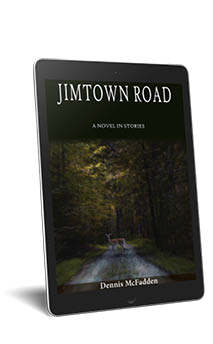READ AN EXCERPT

Alone in his shop, Lena on the phone, fifty miles away in her own lonely shop, she told him they thought it was breast cancer.
The silence after was a roar in his head.
Cancer in those days meant dead. 1961.
“Are they sure?”
“How the hell can I get breast cancer?” She was angry. “In these little things? I could see if I had a rack like…like…”
“Like Mrs. Chestnut?” he said helpfully.
She laughed or sobbed, or both. They’d joked about her little boobs before. Whenever the subject of size came up, D-cup, C-cup or B-cup, she’d always maintained that her size was tea-cup. “Bad things come in small packages,” she said.
The May sunshine was cold and sterile, contrary to everything God intended May to be, but then everything on the drive to Cranberry, the drive he’d made hundreds of times before, was foreign and unfamiliar, including his own heartbeat, which he couldn’t chase out of his throat. He counted cows for a while to avoid thinking, but there was no fun in that without Georgie in the backseat, without the heat of cow-counting competition. How Georgie cried, actual tears, when they passed a graveyard on his side and he lost all his cows (the rules of the game), and John felt tears in his own eyes, no graveyard in sight, just Lena’s little boobs, and the sight of her walking away with another man. Two or three years after he met her, Lena had dated for a while. She was open about it—he was married, why shouldn’t she date?—and once, a miscommunication, John had arrived just before Vincent, the man she was seeing. John (Lena introduced him to Vincent as an old friend) watched them walk out the door, watched her walk away across the yard to his car, watched Vincent put his arm around her, snow flurries in the air, Christmas music on the radio, and it was all he could do not to cry.
In a field he witnessed a little cow chasing its mother, a little calf, Mrs. Chestnut and her fatted calves, the toilet paper trailing, Lena laughing, the Closed sign in the window of his shop, middle of the day. You must keep regular hours, so your customer can depend on you to be there when you say you’ll be: the Gospel according to Bish. No matter, not today. Should Alice, Edna, any of his friends or customers, ask where’d he’d been, he’d say simply that he’d gotten bored and decided to treat himself to a movie at the Harmony Mills Mall. After ten years of living a double life, John had developed an expertise in easy deception. Or maybe today he would tell them his lover was grievously ill and he’d gone to her. Maybe today he just didn’t care. Maybe.
“My Aunt Dorothy had it,” Lena said, her pale skin too small for her face. “She had a radical mastectomy. That’s what they call it when they cut off your boobs, John.”
A little booger hanging from the front of her nostril troubled him. It was not the kind of thing easily mentioned in the course of a conversation such as this, so John reached over and snatched it, and she said ouch and juked back. “You had something on your nose,” he said. She frowned at him. “I love you,” he said.
“Yeah, right,” she said. “What, a booger?”
He’d wanted to hold her, to comfort her, to say something noble and uplifting, words to give her hope. Instead he’d snatched a booger from her nose. The rickety kitchen chair gave a squawk beneath his bulk. In the window, the bluebird light-catcher refused to catch light, the sun behind a cloud. “I’m hungry,” he said. “Want to get something to eat?”
“Haven’t you been listening?” she said. “The biopsy results came back.”
His stomach growled, as though it were talking back. “I’m sorry,” he said, but whether he was apologizing for his stomach talking back, or for not listening, or for being hungry, or for the biopsy results coming back, he couldn’t be sure. Neither could she. He said, “I love you,” again when she didn’t say anything else.
She made a fist. Her face was a fist that looked away, toward the bluebird that refused to shine, then up to her mud-colored cupboards. “Yeah, right,” she said.
About The Book
Winner of the 2016 Press 53 Award for Short Fiction, Jimtown Road, by Dennis McFadden, takes readers on a years-long journey through the small Pennsylvania town of Hartsgrove by way of linked stories that “offer an unblinking look, illuminated with burning intensity by the ever-present moon, at the darkest parts of the human heart” (Ray Morrison), and reads like “a page-turning mystery thriller” (Donald Ray Pollack). “These stories, these characters, this town,” according to Patricia McNair, will “inhabit [you] like an ache, like an exquisite yearning.”

Continue Reading…
Article originally Published in the February/March 2020 Issue “Short Stories”
